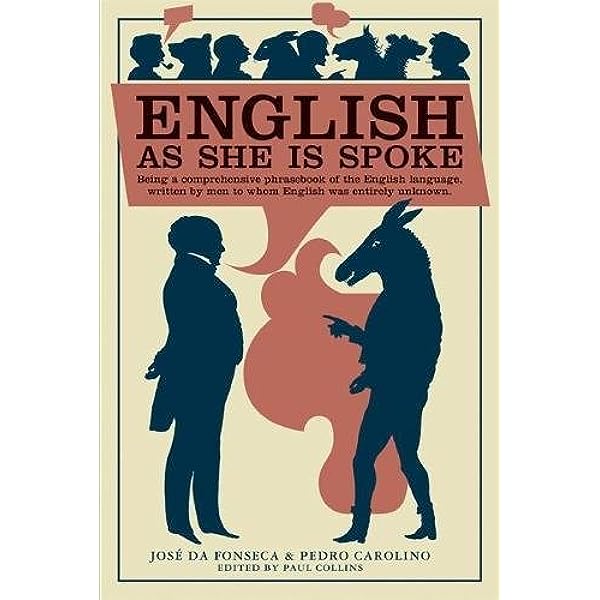by Fraser Hibbitt for the Carl Kruse Blog
Halfway through the nineteenth century, a little book appeared in Paris under the title of O Novo Guia da Conversação em Portuguez e Inglez. The author, Pedro Carolinho, apparently died in 1866 – the only other information I could find was that he was born in 1788. Birth, the book, and then death. Luckily, or perhaps unluckily, for Carolinho, it was just short of twenty years after his death before the book would force its way through the newspapers and magazines across the U.K. and the U.S.
The book, published in English as English As She is Spoke, is a perfect absurdity. That makes it difficult to say anything about it, other than to praise it and accept it. Get the book, fuddle through the introduction and you’ll find: ‘We were increasing this second edition with a phraseology, in the first part. And some familiar letters, anecdotes, idiotisms, proverbs, and to second a coin’s index’. Or do as Mark Twain suggested, after his brief praise, and open the book at random and quote the first thing you read:
The hunting
There is it some game in this wood?
Another time there was plenty some black beasts and thin game, but the poachers have killed almost
all!.
Look a hare who run! Let do him to pursue for the hounds! It go one’s Here that it rouse. Let aim it! Let make fire him!
I have put down killed.
Me, I have failed it; my gun have miss fixe.

You will now see what has entered the English language and will hopefully never leave it; with even the greatest strain and effort, who could come up with this comedy: ‘I have put down killed’? how funny it is to think of Carolinho sitting somewhere after his great work has been completed, knowing it is safely published in Paris and believing it will be a faithful guide – perhaps he goes to the window, testing his new-found language: “ah, the sun begins to dissipe it”. It was his fine touch to add the name ‘José da Fonseca’ as a co-author. José da Fonseca had written, by all accounts, a fairly standard and reliable Portuguese-to-French phrasebook, apparently the one Carolinho had used in the creation of his phrasebook. Knowing no English, Carolinho used da Fonseca’s book to translate Portuguese into French and then used a French-to-English dictionary to compile a book, with da Fonseca’s credibility, that is endlessly quotable.
The publisher also deserves some praise; it is lucky he had no editor. Another unknown figure, J.P. Aillaud, can boast of the privilege. Strangeness in translation is not so uncommon, perhaps you’ve seen some of these menus that say something like ‘salad laminated of goat’, or a sign saying: ‘avoid the hubbub of civilisation’, but these have no pretension, no aim of educative instruction, which Carolinho’s little book dedicates itself to: ‘we expect then, who the little book (for the care we wrote him, and for her typographical correction) that may he worth the acceptation of the studious persons, and especially the Youth, at which we dedicate him particularly’.
Only conjecture revolves around why Carolinho desired to write the book, or even what he thought of the book. One can only imagine how he would have interpreted the book’s review in the 1860 edition of the Harvard Magazine, where the reviewer writes: ‘no one, I think, will feel disposed to question its title to novelty’. However, I cannot put the thought from my mind that Carolinho managed to leave a personal remark, a little dialogue with himself, amongst the customary dry form of the phrasebook:
The french language
Do you study?
Yes, sir, I attempts to translate of french by portuguese.
Do you know already the principal grammar rules?
I am appleed my self at to learn its by heart.
Do speak french alwais?
Some times; though I flay it yet.
You jest, you does express you self very well.
===============
The Carl Kruse Blog Homepage click here.
Contact: carl AT carlkruse DOT com
Other articles by Fraser include – Carlo Gesualdo, Award For Worst Intro, and Matters of the Occult.
Also find Carl Kruse on XING.
Insanity!